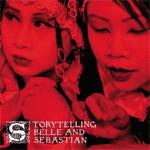|
|
|
|
|
| archive : A B C D E F G H I J K L M N O P Q R S T U V W X Y Z | ||||
|
| ||
 Belle and Sebastian
Belle and SebastianStorytelling [Jeepster/Matador; 2002] Rating: 6.5 Todd Solondz' Storytelling was, by most standards, a disappointing exercise in borderline-intellectual unpleasantry and pretentious indie-filmmaker posturing. Conceived as a three-part anthology centering on the themes of "Fiction," "Non-Fiction," and "Autobiography," the film was stripped of its lengthy third sequence when, depending on who you believe, the segment was determined to be redundant and inferior-- or, excised at the studio's request when they discovered, to their horror, Dawson Creek star James Van Der Beek on the receiving end of simulated anal sex. The completed Storytelling was released earlier this year with an anemic 87-minute running time and a ludicrously censored interracial sex scene (which placed an enormous crimson rectangle not just over the offending areas of adjacent black and white skin, but completely obscuring the actors). Two artists were commissioned by Solondz to score the remaining sections of Storytelling-- Shudder to Think's Nathan Larson and the Cardigans' Nina Persson the "Fiction" segment, which concerns a white community-college student's fascination with her black writing-class professor, and Belle and Sebastian the "Non-Fiction" segment, about a second-rate filmmaker's attempts to document the life of a completely aimless high school student. The choice of Belle and Sebastian to score a film seemed a coup for Solondz, a tactic which backfired when it was widely reported that most of Belle and Sebastian's score and several original songs written for the movie simply wouldn't be used. The move reportedly incensed both the band and the film's distributor, AOL Time Warner subsidiary New Line Cinema, who were counting on a killer soundtrack to help sell the film. Storytelling, predictably, was a critical and commercial flop, even among those who really wanted to like the film, with many viewing its brevity and heavily censored content as a sorry compromise. Belle and Sebastian's Storytelling is a compromise as well, as this schizoid album is clearly divided by what Belle and Sebastian consider a soundtrack (Breakfast at Tiffany's, The Graduate) and what New Line considers a soundtrack (Pulp Fiction, apparently). Coming in at a tidy 38 minutes, Storytelling is a disorienting hodgepodge of new songs and instrumental score padded with annoying segments of dialogue from the movie. Belle and Sebastian's instrumental score is mostly comprised of variations on a theme, in this case the ambling piano loops and soaring strings of "Fiction." It's a pleasant enough melody, revisited thrice on Storytelling: with variations in a minor key on "Freak," with cavernous echo and vibes on "Night Walk," and a more propulsive reading with percussion on "Fiction (Reprise)." Different instruments are used to convey particular themes or characters: a majestic horn and gentle undulations of harp mark "Consuelo"; similar instrumentation explodes into Latin exotica on the Sergio Mendes-flavored "Consuelo Leaving." The lonesome, harmonica-driven "Fuck This Shit" floats along on a Mancini-inspired river of cheesy 60s strings, despite an unfortunate resemblance to the music in Del Taco's late-night commercials (for those of you in Western states and, for some reason, Maryland). The melody is resurrected on the jazzy "Mandingo Cliche," which is unfortunately marred by dialogue from the film throughout. The six vocal cuts are a grab bag of songs only marginally relevant to the film-- "Storytelling" and "Big John Shaft" seemingly more about Hollywood and the process of moviemaking than concerning the Solondz film and its shallow conceits. The twee but extremely catchy title track continues in Fold Your Hands, Child's poppy vein with Schroeder-from-Peanuts piano, flute, and horns and Isobel Campbell trading vocals with Stevie Jackson. Slo-mo funk riffs and spacey vibes give "Big John Shaft" an infectious, cinematic drive as Stuart Murdoch laments a landscape of frustrated screenwriters and typecast actors: "I won't play another heavyweight/ I won't play another Big John Shaft." Jackson's excellent, Spanish-inflected "Wandering Alone"-- a highlight of Belle and Sebastian's 2001 live shows-- is another standout here, though it seemingly has little connection with the film or the rest of the album. The other three vocal contributions are less successful, with Murdoch's almost a capella "I Don't Want to Play Football" barely registering at under 60 seconds. The similarly brief "Scooby Driver," scarcely over a minute long, is much too boisterous and hyperactive for this otherwise low-key, mid-tempo collection. Jackson's fey "Black and White Unite" suffers from thin vocals, inexplicable references to hiking and cricket, and juvenile stream-of-consciousness drivel like, "They're tearing up the street/ I'm half in love with every girl I meet/ The gas man loves the street/ He loves to drill, he loves to think about his girl." So where to stand on a soundtrack that clearly rises above its source material, yet fails to gel as a cohesive record on its own merit? One wonders why Belle and Sebastian insist on an association with Storytelling at all, rather than parceling out their unused compositions to better films. Fans will still consider this album worth owning, if only for "Wandering Alone" and "Big John Shaft," but the lackluster filler and pretty, but generally repetitive, instrumental work make Storytelling little more than a six-cut EP with a dozen bonus tracks. The record is barely longer than a sitcom without the between-tracks dialogue, which gets pretty tiresome after the first listen. However, I don't mind the inclusion of a cheeky dig at Solondz' artistic failure at the tail end of "Fiction (Reprise)." "I'm so, so sorry," mutters the filmmaker played by Paul Giamatti to the stoner lampooned in his documentary. "Don't be," comes the reply. "Your movie's a hit." -Will Bryant, May 17th, 2002
|
||





